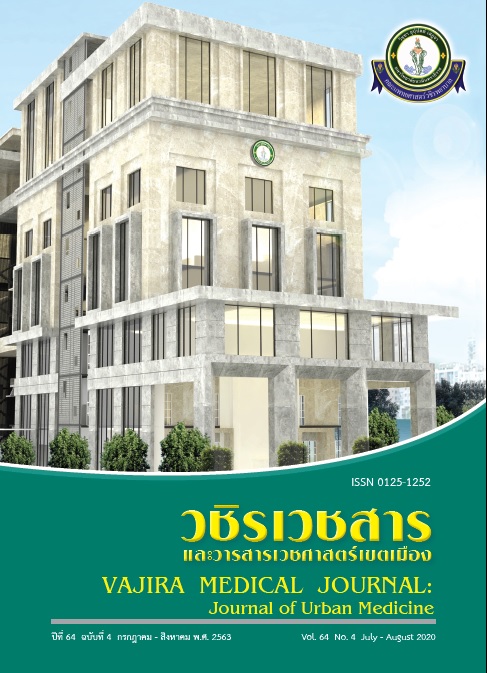Effects of Intensive Dietary Counseling versus Standard Dietary Counseling in Chronic Kidney Disease Patients: The Pilot Study
Main Article Content
Abstract
Background: Chronic kidney disease (CKD) is a major public health problem worldwide, particularly in Thailand. Several studies have recommended limiting protein and sodium intake with the benefit of delaying kidney deterioration. Hence, dietary counseling is recommended for CKD patients. We aimed to explore and compare the effects of intensive dietary counseling (In-counseling) and standard dietary counseling (Sd-counselling) for controlling protein and sodium intake.
Methods: The present study was an open-labeled randomized control trial. The participants were stage III – IV CKD patients who were stable on their current treatment. The Id-counseling group received 30-minute monthly lessons with advice on dietary intake. The Sd-counseling group received the usual standard of care. The outcomes were daily protein intake (DPI) and 24-hour urinary sodium (UNa) at two months.
Results: Twenty CKD patients were divided into two groups of 10 participants each. Baseline characteristics were similar in both groups, except there were more CKD stage 4 patients in Sd-counselling group (3 vs 1 participant). The three most common comorbidities were hypertension (80%), dyslipidemia (70%) and diabetes mellitus (50%). Baseline DPI and 24-hour UNa were similar in both groups. After 2 months, the DPI of the In-counseling group achieved greater target-control than Sd-counseling. There was a trend to decrease 24-hour UNa between before and after counseling in In-counseling group. However, the DPI and 24-hour UNa at the end of the study was not statistically significant.
Conclusion: Although our study did not show significant benefit from In-counselling, it might be due to a small sample size and short time period. There was, however, some trend showing a benefit of In-counselling. A larger scale randomized controlled trial should be conducted to explore this benefit.
Downloads
Article Details
References
Ingsathit A, Thakkinstian A, Chaiprasert A, et al. Prevalence and risk factors of chronic kidney disease in the Thai adult population: Thai SEEK study. Nephrol Dial Transplant. 2010; 25: 1567-75.
Chuasuwan A and Praditpornsilpa K. Thailand Renal Replacement Therapy year 2013. Nephrology Society of Thailand, 2013, p. 27-37.
Mafra D and Leal VO. A practical approach to a low protein diet in Brazil. BMC Nephrol.2016; 17: 105.
Johansen MY, MacDonald CS, Hansen KB, et al. Effect of an Intensive Lifestyle Intervention on Glycemic Control in Patients With Type 2 Diabetes: A Randomized Clinical Trial. JAMA.2017; 318: 637-46.
Akpele L and Bailey JL. Nutrition counseling impacts serum albumin levels. J Ren Nutr. 2004;14: 143-8.
Scialla JJ and Anderson CA. Dietary acid load:a novel nutritional target in chronic kidney disease? Adv Chronic Kidney Dis. 2013; 20: 141-9.
Scialla JJ, Asplin J, Dobre M, et al. Higher net acid excretion is associated with a lower risk of kidney disease progression in patients with diabetes. Kidney Int. 2017; 91: 204-15.
Rebholz CM, Coresh J, Grams ME, et al. Dietary Acid Load and Incident Chronic Kidney Disease:Results from the ARIC Study. Am J Nephrol.2015; 42: 427-35.
Stamler J, Stamler R and Neaton JD. Blood pressure, systolic and diastolic, and cardiovascular risks. US population data. Arch Intern Med. 1993; 153: 598-615.
Sasaki S, Zhang XH and Kesteloot H. Dietary sodium, potassium, saturated fat, alcohol, and stroke mortality. Stroke. 1995; 26: 783-9.
Bibbins-Domingo K, Chertow GM, Coxson PG, et al. Projected effect of dietary salt reductions on future cardiovascular disease. N Engl J Med.2010; 362: 590-9.
Effects of dietary protein restriction on the progression of moderate renal disease in the Modification of Diet in Renal Disease Study.J Am Soc Nephrol. 1996; 7: 2616-26.
Menon V, Kopple JD, Wang X, et al. Effect of a very low-protein diet on outcomes: long-term follow-up of the Modification of Diet in Renal Disease (MDRD) Study. Am J Kidney Dis. 2009;53: 208-17.
Paes-Barreto JG, Silva MI, Qureshi AR, et al. Can renal nutrition education improve adherence to a low-protein diet in patients with stages 3 to 5 chronic kidney disease? J Ren Nutr . 2013; 23:164-71.


